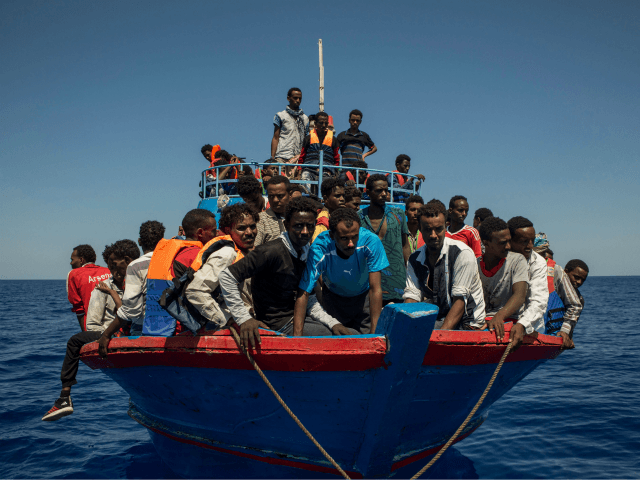Opposition
to MASS, illegal immigration is restricted to the “far-Right”....
or is it?
A NWO diktat - criticism of mass migration would become ILLEGAL
MEP
WARNS NEW UN PACT WILL MAKE IT ILLEGAL TO CRITICIZE MASS IMMIGRATION
Media
outlets that give room to criticism“ of migration can be shut down”
22
November, 2018
MEP
Marcel de Graaff warns that the United Nations global compact on
migration will make it a criminal offense for citizens and media
outlets to criticize mass immigration.
Speaking
during a press conference in the European Parliament, de Graaff,
Co-President of the ENF and leader of the Party for Freedom in the
European Parliament, said that the deal represented “a coup d’etat
of pro-migration liberal globalists, which will greatly benefit
multinationals.”
“One
basic element of this new agreement is the extension of the
definition of hate speech. The agreement wants to criminalize
migration speech. Criticism of migration will become a criminal
offense. Media outlets that give room to criticism of migration can
be shut down,” warned de Graaff.
“In
fact, it will become impossible to criticize Merkel’s welcome
migrants politics without being at risk to be jailed for hate
speech,” he added, noting, “Countries who import the third world
will become the third world.”
The
MEP also pointed to the rise in rapes and violent attacks that have
been recorded in numerous western countries since the mass migration
of millions of people from mainly Islamic countries since 2015.
The
UN’s global compact on migration is not legally binding, but
governments will be under pressure to follow its dictates.
Hungary’s
populist government has warned that the deal would establish a “human
right to find a new place around the globe”.
Australia
became the latest country to publicly announce it will refuse to sign
the pact, with Prime Minister Scott Morrison asserting the deal
would, “undermine Australia’s strong border protection laws and
practices” and encourage illegal immigration.
He
added that the pact does nothing to distinguish between legal and
illegal immigrants with respect to the provision of welfare and
benefits.
Israeli
Prime Minister Benjamin Netanyahu has also said he will refuse to
sign the deal. The United States pulled out of the compact last year,
asserting that border powers should remain under the control of
sovereign nations. The Swiss government has also indicated it will
not sign up to the pact, as have Austria and Hungary.
 Hungary’s
foreign minister Péter Szijjártó has condemned the UN Migration
Pact for attempting to “legalise illegal immigration,” announcing
his country will vote ‘no’ on the agreement in Marrakesh in
December.
Hungary’s
foreign minister Péter Szijjártó has condemned the UN Migration
Pact for attempting to “legalise illegal immigration,” announcing
his country will vote ‘no’ on the agreement in Marrakesh in
December.
Mr
Szijjártó told media on Thursday that “The goal of the UN Global
Compact for Migration is to legalise illegal immigration, which is
totally unacceptable and violates the sovereignty of member states,
including that of Hungary.”
“The
UN is making the same mistake as the European Union, which wants to
base its own migration policy on mandatory resettlement quotas,” he
continued.
“The
UN Compact is more dangerous, however, because it is a global
initiative, meaning it will have a greater effect than [European]
policy, and represents a risk to the whole world.”
Confirming
that Hungary will be voting “No” to the Global Compact for Safe
and Orderly Migration in Marrakesh, Morocco, next month, the minister
said the government’s main issue with the Compact is “whether or
not it is mandatory, and in view of the fact that the document
contains the word ‘obligation’ on eighty occasions, the claim
that it only includes recommendations is a false one.”
“A
legally not binding document would not prescribe the establishment of
national action plans, and accordingly it is ‘clearer than day’
that, just like the originally voluntary mandatory quota, the Global
Compact for Migration will become a point of reference, mandatory,
and the basis for international judicial decisions,” the minister
of foreign affairs and trade explained.
Hungary’s
statement that the ‘non-binding’ Compact can, in fact, be
‘binding,’ came days after Dutch MEP and Co-President of the
Europe of Nations and Freedom (ENF) group Marcel de Graaff said that
“it is still the legal framework on which the participating
countries commit themselves to build new legislation.”
Calling
it “a legalisation of mass migration,” the Dutch populist said:
“It’s declaring migration a human right.”
Belgian
law professor Pierre d’Argent has argued the migration agreement,
like other UN compacts, could be used by lawyers in interpreting
laws, with German law professor Matthias Herdegen noting the UN
compact occupied a “legal grey area” which “gives the
impression of [state] liability.”
Mr
de Graaff also warned this week that the document could be used as a
basis for making criticism of mass migration illegal, saying: “One
basic element of this new agreement is the extension of the
definition of hate speech… Criticism of migration will become a
criminal offence. Media outlets that give room to criticism of
migration can be shut down,” he claimed.
“In
fact, it will become impossible to criticise Merkel’s ‘welcome
migrants’ politics without being at risk to be jailed for hate
speech,” de Graaff added.
On
Wednesday, German Chancellor Angela Merkel, the architect of the
European migrant crisis, made an impassioned defence of the UN
Migration Compact, saying there should be “no compromise” on
global mass migration and condemned opposition as “nationalism in
its purest form.”
Apart
from Hungary, Australia, Israel and several other countries have said
that they will not sign the document or have signalled that they will
not, following the lead of U.S. President Donald Trump who rejected
the compact in December 2017.
No comments:
Post a Comment
Note: only a member of this blog may post a comment.